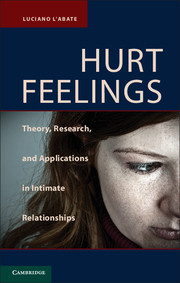Book contents
- Frontmatter
- Contents
- Preface
- Acknowledgments
- Introduction
- Part One Background
- 2 Hurts
- 3 The Origins of Hurt Feelings
- 4 The Developmental Socialization of Hurt Feelings
- 5 Hurt Feelings in the Family
- Part Two The Scientific Bases of Hurt Feelings
- Part Three Applications of Hurt Feelings in Mental Health
- Part Four Models of Hurt Feelings In Theory and Applications
- Appendix A An Informed Consent Form to Deal with Hurt Feelings
- Appendix B Experimental Scale of Unexpressed Hurt Feelings
- References
- Author Index
- Subject Index
4 - The Developmental Socialization of Hurt Feelings
from Part One - Background
Published online by Cambridge University Press: 05 June 2012
- Frontmatter
- Contents
- Preface
- Acknowledgments
- Introduction
- Part One Background
- 2 Hurts
- 3 The Origins of Hurt Feelings
- 4 The Developmental Socialization of Hurt Feelings
- 5 Hurt Feelings in the Family
- Part Two The Scientific Bases of Hurt Feelings
- Part Three Applications of Hurt Feelings in Mental Health
- Part Four Models of Hurt Feelings In Theory and Applications
- Appendix A An Informed Consent Form to Deal with Hurt Feelings
- Appendix B Experimental Scale of Unexpressed Hurt Feelings
- References
- Author Index
- Subject Index
Summary
Development implies a process of internal growth, whereas socialization implies a process of emergence produced by the complex interaction of the organism with environmental influences (Saarni, 2008). We need both processes to understand how feelings in general and hurt feelings in particular originate. Development usually is evaluated according to ages and stages of the life cycle, whereas socialization is such a constant and continuous process that is difficult to conceptualize it according to levels of emotional, cognitive, and social functioning, including personality characteristics. Nonetheless, both processes are necessary because different individuals react differently to environmental influences and to hurt feelings. For instance, what could be hurtful at one age might not be longer hurtful either at a younger or older age or vice versa.
However, one cannot consider age as a criterion to evaluate the hurtfulness of a word or a deed. Malatesta-Magai (1991), for instance, proposed that socialization of affective expression constitutes a major item on the parental socialization agenda. That expression has a material individualizing impact on the development of personality, focusing on the role of social influences and addressing what and how socialization experiences may interact with innate dispositions. After a brief overview of the history of (laboratory-based) research on emotions, she presented a summary of some of the essential features of Silvan Tomkins’s (1962, 1963) “affect theory.” Unfortunately, there is no room to expand on that seminal theory. The bulk of Malatesta-Magai’s discussion involves an analysis of three studies from her laboratory that can be interpreted within the framework of affect theory and that appear to support several of Tomkins’s formulations; examples are drawn from emotional socialization research work with both normal and clinical participants: In normal and “at risk” infants, emotional exchange patterns of contempt and shame in affect socialization were found between depressed mothers and their four- to six-year-old children.
- Type
- Chapter
- Information
- Hurt FeelingsTheory, Research, and Applications in Intimate Relationships, pp. 92 - 105Publisher: Cambridge University PressPrint publication year: 2011

